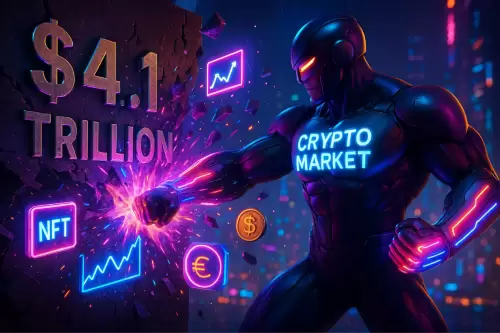 |
|
 |
|
 |
|
 |
|
 |
|
 |
|
 |
|
 |
|
 |
|
 |
|
 |
|
 |
|
 |
|
 |
|
 |
|
Cryptocurrency News Articles
South Korea is all set to dramatically reshape its digital asset landscape, potentially positioning itself as a global leader in cryptocurrency regulations.
Jun 11, 2025 at 02:00 pm
Under the leadership of newly-elected President Lee Jae-myung, the ruling Democratic Party has unveiled the Digital Asset Basic Act.

South Korea is set for a dramatic reshaping of its digital asset landscape, potentially positioning itself as a global leader in cryptocurrency regulations.
This transformation is unfolding rapidly with the ruling Democratic Party, headed by President Lee Jae-myung, introducing the Digital Asset Basic Act. The aim is to enhance transparency and foster competition within the crypto sector.
A cornerstone of this ambitious plan is the clear intent to facilitate stablecoin use and issuance.
South Korea pushes for stablecoin regulations
Notably, President Lee’s campaign promise to permit domestic stablecoin issuance is now rapidly translating into concrete policy.
This proactive and defined approach to digital asset governance raises a crucial question – Will South Korea’s upcoming regulatory framework grant it a distinct competitive advantage over nations like the United States in the evolving global crypto industry?
Commenting on the same, Lee said,
“We need to establish a won-backed stablecoin market to prevent national wealth from leaking overseas.”
Additionally, beyond its significant focus on stablecoins, South Korea has been demonstrating a broader commitment to integrating cryptocurrencies into its financial landscape.
For this, President Lee Jae-myung’s administration is now exploring various avenues. Including a proposal for the country’s national pension fund to consider Bitcoin [BTC] and other crypto investments.
Furthermore, the nation is actively investigating the feasibility of establishing a dedicated Bitcoin reserve.
What’s more to the bill?
South Korea has already begun to amend its anti-money laundering (AML) regulations, with the explicit goal of encouraging greater participation from foreign investors within its domestic crypto market.
Hence, as nations worldwide grapple with the complexities of digital asset regulation, both the United States and South Korea are taking decisive steps to establish clear legal frameworks for stablecoins, albeit with distinct philosophies.
In the U.S, the GENIUS Act, currently undergoing a crucial Senate vote, primarily targets payment stablecoins.
It proposes a dual regulatory model, with federal oversight for large issuers boasting over $10 billion in circulation and state-level management for smaller entities. This approach aims to provide clarity without encompassing the entire spectrum of digital assets.
Conversely, South Korea’s Digital Asset Basic Act, championed by President Lee Jae-myung, adopts a more sweeping approach. It intends to regulate a broader range of digital assets, including asset-linked tokens beyond just payment stablecoins, all covered by a comprehensive digital finance umbrella.
How is it different from the U.S GENIUS Act?
While both legislative efforts mandate licensing requirements and seek to promote safer stablecoin adoption, their implementation strategies diverge significantly.
South Korea centralizes all stablecoin issuance approval under its Financial Services Commission, a move that promises consistency but has drawn criticism from the Bank of Korea for concentrating regulatory power.
In contrast, the GENIUS Act introduces a more decentralized model, allowing for state-level regulation where appropriate.
Furthermore, a key difference lies in consumer protection specifics. The U.S. bill includes stringent transparency requirements, anti-fraud measures, and explicit mandates for anti-money laundering and know-your-customer compliance.
While South Korea’s bill emphasizes transparency and reserve guarantees, it currently lacks the detailed rules around user-facing protections found in its American counterpart.
Disclaimer:info@kdj.com
The information provided is not trading advice. kdj.com does not assume any responsibility for any investments made based on the information provided in this article. Cryptocurrencies are highly volatile and it is highly recommended that you invest with caution after thorough research!
If you believe that the content used on this website infringes your copyright, please contact us immediately (info@kdj.com) and we will delete it promptly.






























































